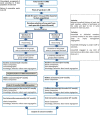Effects of improved information and volunteer support on segregation of solid waste at the household level in urban settings in Madhya Pradesh, India (I-MISS): protocol of a cluster randomized controlled trial
- PMID: 33836723
- PMCID: PMC8033734
- DOI: 10.1186/s12889-021-10693-0
Effects of improved information and volunteer support on segregation of solid waste at the household level in urban settings in Madhya Pradesh, India (I-MISS): protocol of a cluster randomized controlled trial
Abstract
Background: Segregation of household waste at the source is an effective and sustainable strategy for management of municipal waste. However, household segregation levels remain insufficient as waste management approaches are mostly top down and lack local support. The realisation and recognition of effective, improved and adequate waste management may be one of the vital drivers for attaining environmental protection and improved health and well-being. The presence of a local level motivator may promote household waste segregation and ultimately pro-environmental behaviour. The present cluster randomized control trial aims to understand if volunteer based information on waste segregation (I-MISS) can effectively promote increased waste segregation practices at the household level when compared with existing routine waste segregation information in an urban Indian setting.
Methods: This paper describes the protocol of an 18 month two-group parallel,cluster randomised controlled trialin the urban setting of Ujjain, Madhya Pradesh, India. Randomization will be conducted at ward level, which is the last administrative unit of the municipality. The study will recruit 425 households in intervention and control groups. Assessments will be performed at baseline (0 months), midline (6 months), end line (12 months) and post intervention (18 months). The primary outcome will be the comparison of change in proportion of households practicing waste segregation and change in proportion of mis-sorted waste across the study period between the intervention and control groups as assessed by pick analysis. Intention to treat analysis will be conducted. Written informed consent will be obtained from all participants.
Discussion: The present study is designed to study whether an external motivator, a volunteer selected from the participating community and empowered with adequate training, could disseminate waste segregation information to their community, thus promoting household waste segregation and ultimately pro-environmental behaviour. The study envisages that the volunteers could link waste management service providers and the community, give a local perspective to waste management, and help to change community habits through information, constant communication and feedback.
Trial registration: The study is registered prospectively with Indian Council of Medical Research- Clinical Trial Registry of India ( CTRI/2020/03/024278 ).
Keywords: Household waste segregation; India; Protocol; Randomised controlled trials; Solid waste management; Urban.
Conflict of interest statement
None.
Figures
References
-
- Kaza S, Yao L, Bhada Tata P, Woerden FV. What a Waste 2.0: A Global Snapshot of Solid Waste Management to 2050. 2018.
Publication types
MeSH terms
Substances
Grants and funding
LinkOut - more resources
Full Text Sources
Other Literature Sources


